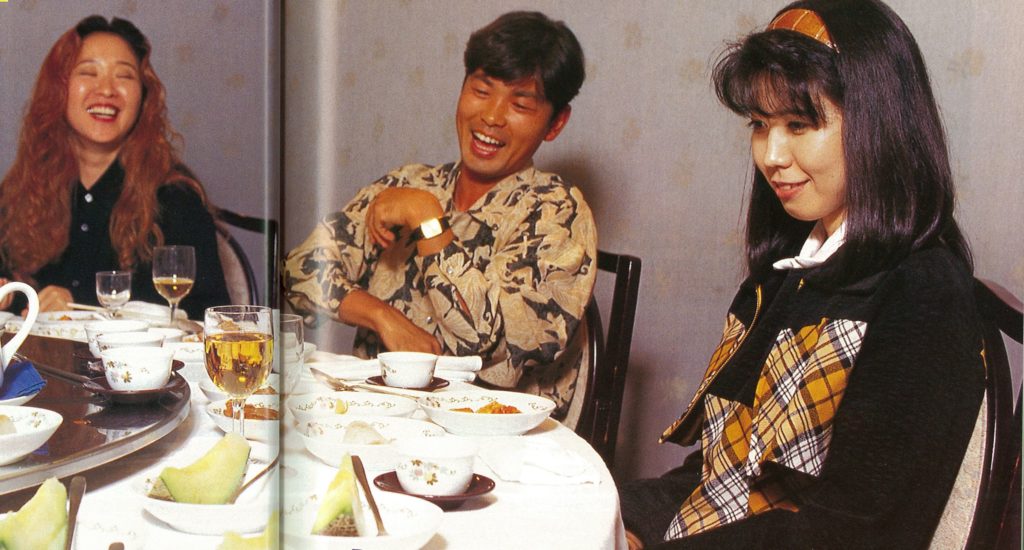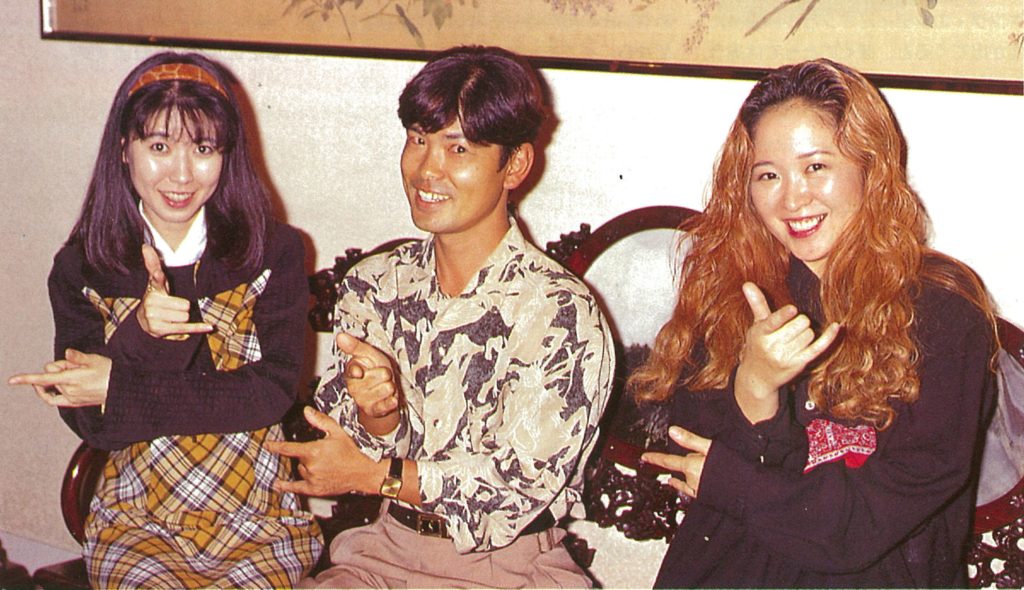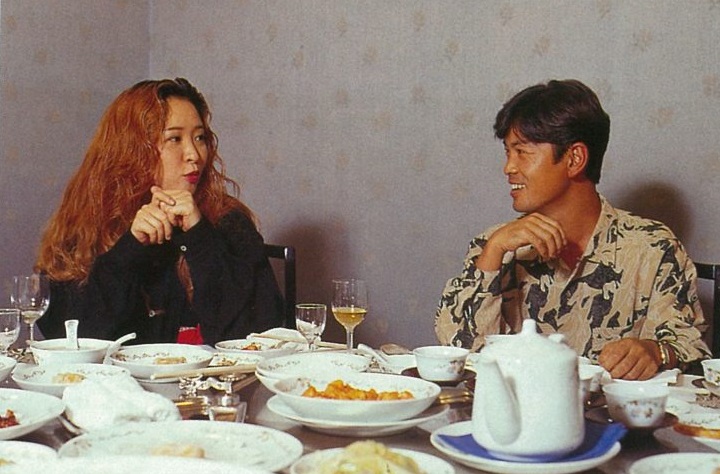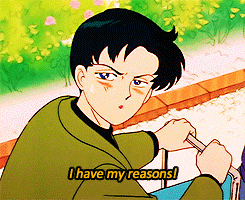Lunar Logs is a weekly series featuring full translations of interviews with Ms. Takeuchi and others — such as the directors, writers, voice cast, and more — responsible for making Sailor Moon into the massively popular franchise we know it as today. Though not every interview will directly address or even mention Sailor Moon, I find it an interesting look into the minds of these influential figures.
Today we’re taking a look at a roundtable discussion held with the voice cast behind Sailor Moon‘s power couples, Usagi (Kotono Mitsuishi) & Mamoru (Toru Furuya) and Michiru (Masako Katsuki) & Haruka (Megumi Ogata).1 I’ve already covered the aspects of the interview that pertain to Michiru & Haruka’s relationship in the past, so today we’re going to look at some of the difficulties Kotono faced with portraying Usagi’s character growth.
Read on for the interesting behind-the-scenes character interactions and enjoy some lovely 90s style clothing while we’re at it!

Masako Katsuki, Toru Furuya, and Kotono Mitsuishi join in a roundtable discussion about Sailor Moon S
Kotono’s concerns over Usagi’s growth
Interviewer: How did you feel in the beginning about playing the main character?
Kotono: When I saw the audition materials, I knew I really wanted to get this role. When I performed at the audition, it was the first time I’d felt so good about how I performed, and it felt just like I’d let out a long sigh of relief. The producers later told me that they liked how the way I read the lines was different from how everyone else had done it. I guess I really threw everything I had everything I had at it in the beginning.
Interviewer: Has your image of Usagi as a character changed over time?
Kotono: I’ve kind of gotten used to her as a character and now it feels like I’m playing [the role of Usagi] in a pattern-like manner, so I feel like I need to remind myself of when it was all new and fresh in the beginning.
Interviewer: Have you done anything different?
Kotono: I believe that Usagi has become who she is now through her strength and all the things she’s been through, but at the start [of the series] I had been told that ‘Usagi doesn’t grow up.’ However, I feel like she has…
Toru: She has, and Usagi herself has changed a lot. In that sense, it’s completely natural that [how Kotono performs the role of Usagi] would change from how it was in the beginning and now that she’s used to the character. Any role [a voice actor plays] for a long time is like that. After you’ve done it for over a year, you will absolutely get used to the character and a pattern will develop. In reality, keeping to that pattern is difficult, so I don’t see a problem with that.
Kotono: I always give it my all, but lately doubts start to creep into my mind, making me wonder ‘is this really good enough?’
Toru: That’s fine, really. Rather, the loss of confidence is the scarier of the two. I think you just need to believe that this is good enough and that there’s nothing long to carrying on in this patten-like manner.
Kotono: Hmm… thank you for the advice.
Toru: Actors are really enthusiastic when starting a new role or production with their thoughts consumed with how they should perform. That kind of work is a lot of fun. But as you continue [performing the role] over a long period of time, you naturally need to devise different ways [to maintain that enthusiasm]. Around that time, the viewers have already developed an image of the character as if they were a living, breathing person and this is how they are, so deviating from that would be the wrong choice. That’s why I think it’s important to maintain the pattern [for performing the character].
Honestly, I’m kind of curious who had told Kotono in the beginning that Usagi wouldn’t change or grow as a character. Even throughout the first season, Usagi underwent significant character growth, even while maintaining her somewhat immature, childlike demeanor.
Ah well, let’s continue!
Mamoru Chiba and Neptune
Interviewer: Do you feel tied down with characters you’ve played for a long time?
Toru: That does happen, yes. As an actor, I feel like I’m supposed to express different parts of myself and feel lost over how I can continue to expand on the role. It’s quite hard to [perform the role] without feeling lost. That’s why I can’t get lost in just thinking about [the role] as only being Tuxedo Mask. To me, I feel like I have other roles in playing different parts of the character, such as with King Endymion. In cases like that, I need to create an entirely new role, which helps get me enthusiastic [about the role] all over again. In that sense, Sailor Moon is a story structured across multiple levels, allowing you to create new roles and new performances.
Interviewer: You portray Neptune as rather mysterious.
Masako: She definitely doesn’t come across like you would in day-to-day life, and she rarely expresses her feelings in a straight-forward manner. They [the production staff] keep telling me ‘don’t put a lot of feeling into it!’ I really want to put my emotions behind it, but the production staff doesn’t want me to do it like that. But I can’t completely keep my emotions out of it, you know. That’s why I’m constantly thinking about where to put feeling into it, and where to suppress.
Interviewer: So did you put a lot of emotion into other roles you’ve performed thus far?
Masako: Usually, yes. I first watch the scene and then put whatever I felt into [the recording]. Whether that’s good or bad, I leave the decision for later.
Interviewer: Actually, I felt that your other roles were more suppressed [than Michiru].
Masako: Quite the opposite. The majority of my roles are going all out. In my personal life, I tend to keep my emotions under wraps. (laugh)
Toru: Now that’s scary. (laugh)
I wish Toru and Kotono elaborated a bit more on what it means to perform a role like a ‘pattern’ to get a better sense for what they meant. Clearly, with the passion Kotono threw into her work, she wasn’t ‘phoning it in’ at any point throughout the series and I don’t get the sense that she felt that she was doing a poor job at voicing Usagi, but rather that she perhaps didn’t feel quite as fulfilled by the role as she did when she was ‘creating’ Usagi in the beginning, so to speak.
In any case, it’s fun to see the voice cast hanging out together and chatting about their careers rather than the usual one-on-one interviews I usually stumble across. I seem to recall seeing a similar interview style with all five of the Inners in the past, so maybe I’ll try to dig that up soon if I can find it!
As usual, if there are any specific interviews you’d like to see translated, let me know down in the comments below!
References:
- See pp. 34-35, 36-37, and 38-39 of The Seiyuu 1995 ↩




I assume “pattern” in this context is like a pattern in sewing, where you have to get into the groove of it and repeat it constantly so you don’t throw the whole thing off. Like, you have to repeat aspects of the performance in voice acting so you don’t accidentally change the way a character sounds or behaves- many voice actors have techniques to accomplish this (Kathy Najimy, voicing Peggy Hill on “King of the Hill”, used to repeat a phrase to herself to capture Peggy’s accent… but eventually she was good enough at it that she no longer had to do it).
Regarding the negative aspects of it, it seems like she’s aware that it’s easy to fall into the trap of doing it by “rote”, where you just mindlessly repeat past performances and don’t put anything new into it. So she’s trying to avoid doing that, now that she’s very used to voicing the character- it allows at actor to put more emotion into it rather than just reciting the lines using the same old voice (which is actually quite boring for actors, and makes them enjoy the job less). The director, meanwhile, is like “hey the pattern isn’t so bad” because of course that’s stability and predictability- less stressful.
Other VAs talk about things like this- when I saw Kevin Conroy (RIP) in person at a convention, he talked about performing Batman, and how instead of watching his old stuff and trying to recapture his early performances, he treats every single sit-down in the studio like the first time, placing himself back into the mind of a little boy who lost his parents, awakening a darkness inside of him. So in his case, he’s avoiding getting into the “pattern” at all.
At least that’s my take, given what I’ve heard VAs are like.
Really interesting read thanks for posting. Just found your page 🙂